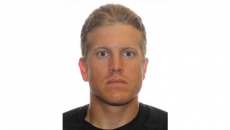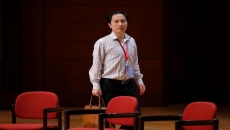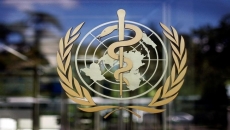WASHINGTON - U.S. President Joe Biden says it's up to democracies around the world to prove that government of, by and for the people is the best way to solve problems.
Biden opened his two-day virtual Summit for Democracy by acknowledging that democratic systems are inherently fragile and often demanding.
He did it from the Eisenhower Executive Office Building across from the White House, sitting with Secretary of State Antony Blinken across from a screen filled with the faces of world leaders, including Prime Minister Justin Trudeau.
In his own remarks, delivered behind closed doors, Trudeau echoed Biden's message that democracy is the best way to unleash human potential.
A news release from Trudeau's office detailed a $5-million contribution of human rights funding to the United Nations and $3 million in support for State Department programs for LGBTQ and religious rights.
Trudeau also touted Canada's leading role in an international declaration against arbitrary detentions, a product of China's three-year imprisonment of Canadian citizens Michael Spavor and Michael Kovrig in 2018.
"We must work together to meet the challenges of today and tomorrow," Trudeau said, according to the release.
"We must continue to work to safeguard our institutions, counter the rise of authoritarianism, and protect and expand democratic rights and freedoms worldwide in order to create a more secure, stable, and prosperous world for future generations."
For his part, Biden promised US$424 million for a global democratic renewal strategy that includes bolstering media freedom, fighting corruption, enlisting technology and defending free and fair elections.
The initiative includes US$30 million to enhance independent media growth in "resource-poor and fragile" locations, as well as a US$9-million "defamation defence fund" to help protect investigative journalism around the world.
There's also more than US$75 million for a multi-pronged offensive aimed at weeding out corruption and money laundering, US$155 million to support democratic reform globally, $85 million to foster free elections and US$28 million to explore and develop ways of leveraging technology to foster democratic ideals.
Government officials, business leaders and activists from more than 110 countries are taking part in the summit, which is unfolding with Russia and China — two of the gathering's most glaring absences — flexing their military muscles at neighbouring Ukraine and Taiwan.
"They seek to advance their own power, export and expand their influence around the world and justify the repressive policies and practices as a more efficient way to address today's challenges," Biden said, without mentioning names.
"That's how it's sold by voices that seek to fan the flames of social division and political polarization."
In his own preamble, Blinken acknowledged the fact that the United States is facing existential challenges to its own political system, not only from foreign autocrats but from within its own borders as well.
"Our democracies are facing growing challenges around the world from within and from without, decreasing citizen trust in government," he said.
"We've seen a democratic recession in recent years. And these are not challenges to be taken lightly. We have a lot of work to do. But that's exactly why we're here today."
Uzra Zeya, the State Department's undersecretary for civilian security, democracy and human rights, made oblique reference to the U.S.'s own deep-seated political challenges during a media briefing earlier this week.
Zeya said the Biden administration is approaching the summit with "both humility and confidence."
"Humility, in that we want to listen and learn and don't shy away from our shortcomings," she said.
"Confidence, in our constant striving for a more perfect union and our certainty that, working together, democracies can and will deliver for the world’s citizens, regardless of the raw deal that autocrats and authoritarians try to sell."
Some critics have denounced what they consider an undemocratic model for the summit itself, for which the agenda and list of participants was drawn up behind closed doors. Much of Thursday morning's proceedings — including Trudeau's remarks — transpired beyond the view of the media.
"While too many 'cooks in the kitchen' is not ideal in conference organization — or, authoritarians would argue, in governing — one on democracy should tolerate the messiness of inclusion," Alliance for Securing Democracy director Laura Thornton wrote in an op-ed that appeared Wednesday on the political website The Hill.
Blinken took part in a "Day 0" pre-game event Wednesday with a group of young activists from around the world who are actively promoting causes like human rights, freedom of expression, gender equality and free and fair elections.
Democracy "has its share of challenges, especially right now," he said, acknowledging that one of the most pressing is the public perception of an outdated and inefficient system that has proven unable to meet the public's needs.
"We do see, in this contest between autocracies and democracies, the argument being made by autocratic leaders that their systems deliver more effectively for people," Blinken told the panel.
"I think that's exactly the opposite of the truth, but it does suggest to all of us that we have a profound stake in demonstrating that democracies can actually deliver concrete results for people in real time — whether it’s for young people or anyone else, for that matter."
The main objective of the summit, Zeya said, will be to lead by example and demonstrate the ways in which democracy does in fact work better than many people might be led to believe.
"This summit is not about taking sides. It's not meant to be divisive or adversarial," she said. "Data shows that free and democratic societies have healthier citizens, less violent conflict, and more prosperous communities. "

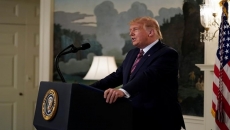
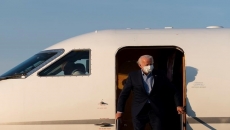
.jpg)
